Comprehensive Report on Legal Aspects of Business: Law of Agency
VerifiedAdded on 2023/01/19
|8
|2721
|91
Report
AI Summary
This report provides a detailed analysis of the legal aspects of business agency, focusing on the relationships between principals and agents. It defines agency as a relationship where one party (the agent) is authorized to act on behalf of another (the principal), exploring the significance of this concept in the business world. The report delves into the creation of agency through express agreements or operation of law, highlighting the importance of fiduciary relationships and the obligations of agents to act loyally and without negligence. It examines different types of agent authority, including express, implied, and apparent (or ostensible) authority, and the implications of each for the principal's liability. The report discusses the legal precedents established in cases such as First Energy (UK) Ltd. V Hungarian International Bank LTd. (1993), Kelly v Fraser (2012), Ramsay James Gordon v Gary Love (2015), and Freeman & Lockyer v Buckhurst Park Projects (1964) to illustrate the application of agency law in various scenarios. Specifically, the report emphasizes the concept of apparent authority, where a third party believes an agent has authority based on the principal's representations. The analysis also covers agency by estoppel and how it protects third parties. The report concludes by summarizing the core elements of agency law, including the importance of establishing authority and the legal consequences of an agent's actions on the principal.

LEGAL ASPECTS
OF BUSINESS
OF BUSINESS
Paraphrase This Document
Need a fresh take? Get an instant paraphrase of this document with our AI Paraphraser

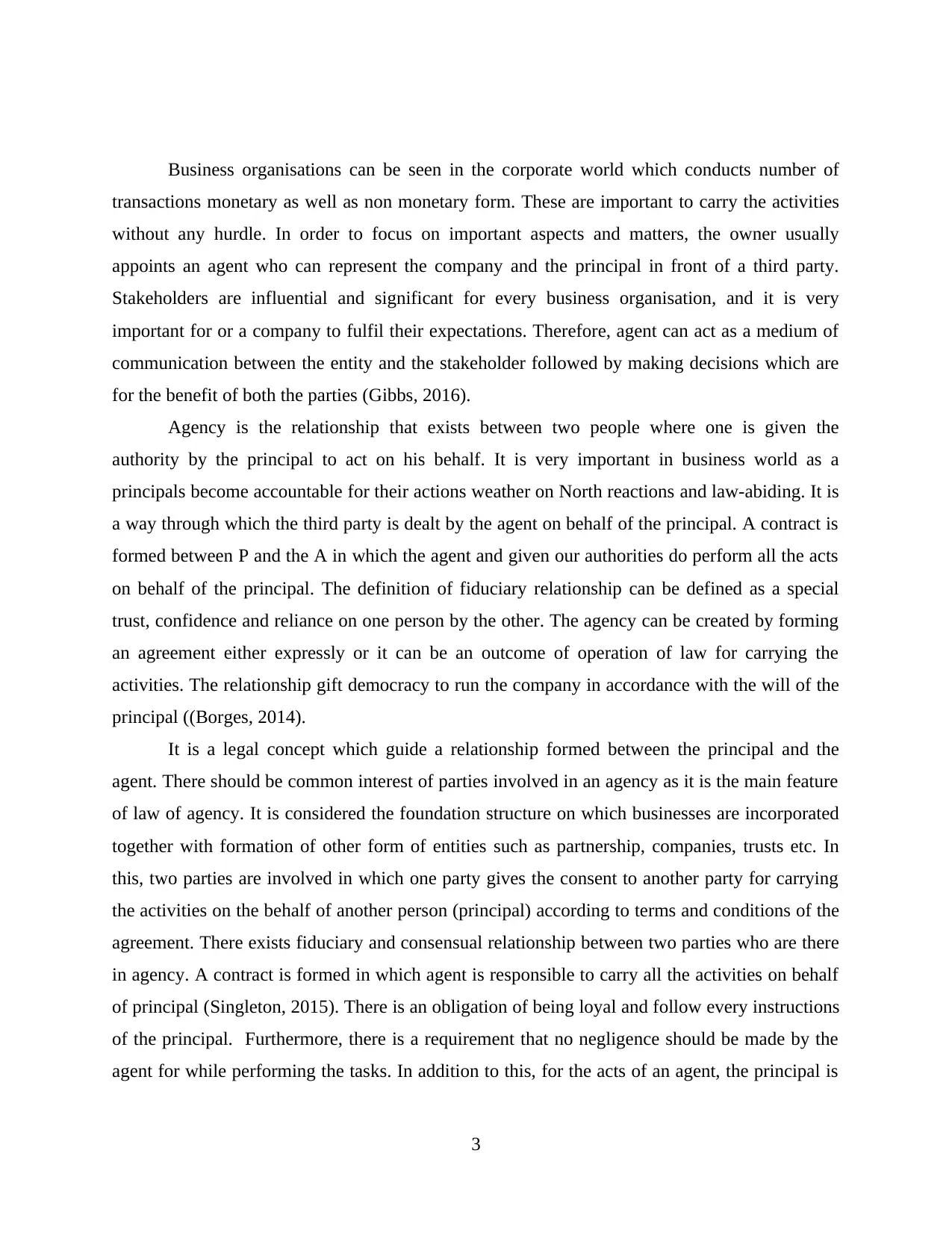
Business organisations can be seen in the corporate world which conducts number of
transactions monetary as well as non monetary form. These are important to carry the activities
without any hurdle. In order to focus on important aspects and matters, the owner usually
appoints an agent who can represent the company and the principal in front of a third party.
Stakeholders are influential and significant for every business organisation, and it is very
important for or a company to fulfil their expectations. Therefore, agent can act as a medium of
communication between the entity and the stakeholder followed by making decisions which are
for the benefit of both the parties (Gibbs, 2016).
Agency is the relationship that exists between two people where one is given the
authority by the principal to act on his behalf. It is very important in business world as a
principals become accountable for their actions weather on North reactions and law-abiding. It is
a way through which the third party is dealt by the agent on behalf of the principal. A contract is
formed between P and the A in which the agent and given our authorities do perform all the acts
on behalf of the principal. The definition of fiduciary relationship can be defined as a special
trust, confidence and reliance on one person by the other. The agency can be created by forming
an agreement either expressly or it can be an outcome of operation of law for carrying the
activities. The relationship gift democracy to run the company in accordance with the will of the
principal ((Borges, 2014).
It is a legal concept which guide a relationship formed between the principal and the
agent. There should be common interest of parties involved in an agency as it is the main feature
of law of agency. It is considered the foundation structure on which businesses are incorporated
together with formation of other form of entities such as partnership, companies, trusts etc. In
this, two parties are involved in which one party gives the consent to another party for carrying
the activities on the behalf of another person (principal) according to terms and conditions of the
agreement. There exists fiduciary and consensual relationship between two parties who are there
in agency. A contract is formed in which agent is responsible to carry all the activities on behalf
of principal (Singleton, 2015). There is an obligation of being loyal and follow every instructions
of the principal. Furthermore, there is a requirement that no negligence should be made by the
agent for while performing the tasks. In addition to this, for the acts of an agent, the principal is
3
transactions monetary as well as non monetary form. These are important to carry the activities
without any hurdle. In order to focus on important aspects and matters, the owner usually
appoints an agent who can represent the company and the principal in front of a third party.
Stakeholders are influential and significant for every business organisation, and it is very
important for or a company to fulfil their expectations. Therefore, agent can act as a medium of
communication between the entity and the stakeholder followed by making decisions which are
for the benefit of both the parties (Gibbs, 2016).
Agency is the relationship that exists between two people where one is given the
authority by the principal to act on his behalf. It is very important in business world as a
principals become accountable for their actions weather on North reactions and law-abiding. It is
a way through which the third party is dealt by the agent on behalf of the principal. A contract is
formed between P and the A in which the agent and given our authorities do perform all the acts
on behalf of the principal. The definition of fiduciary relationship can be defined as a special
trust, confidence and reliance on one person by the other. The agency can be created by forming
an agreement either expressly or it can be an outcome of operation of law for carrying the
activities. The relationship gift democracy to run the company in accordance with the will of the
principal ((Borges, 2014).
It is a legal concept which guide a relationship formed between the principal and the
agent. There should be common interest of parties involved in an agency as it is the main feature
of law of agency. It is considered the foundation structure on which businesses are incorporated
together with formation of other form of entities such as partnership, companies, trusts etc. In
this, two parties are involved in which one party gives the consent to another party for carrying
the activities on the behalf of another person (principal) according to terms and conditions of the
agreement. There exists fiduciary and consensual relationship between two parties who are there
in agency. A contract is formed in which agent is responsible to carry all the activities on behalf
of principal (Singleton, 2015). There is an obligation of being loyal and follow every instructions
of the principal. Furthermore, there is a requirement that no negligence should be made by the
agent for while performing the tasks. In addition to this, for the acts of an agent, the principal is
3
⊘ This is a preview!⊘
Do you want full access?
Subscribe today to unlock all pages.

Trusted by 1+ million students worldwide
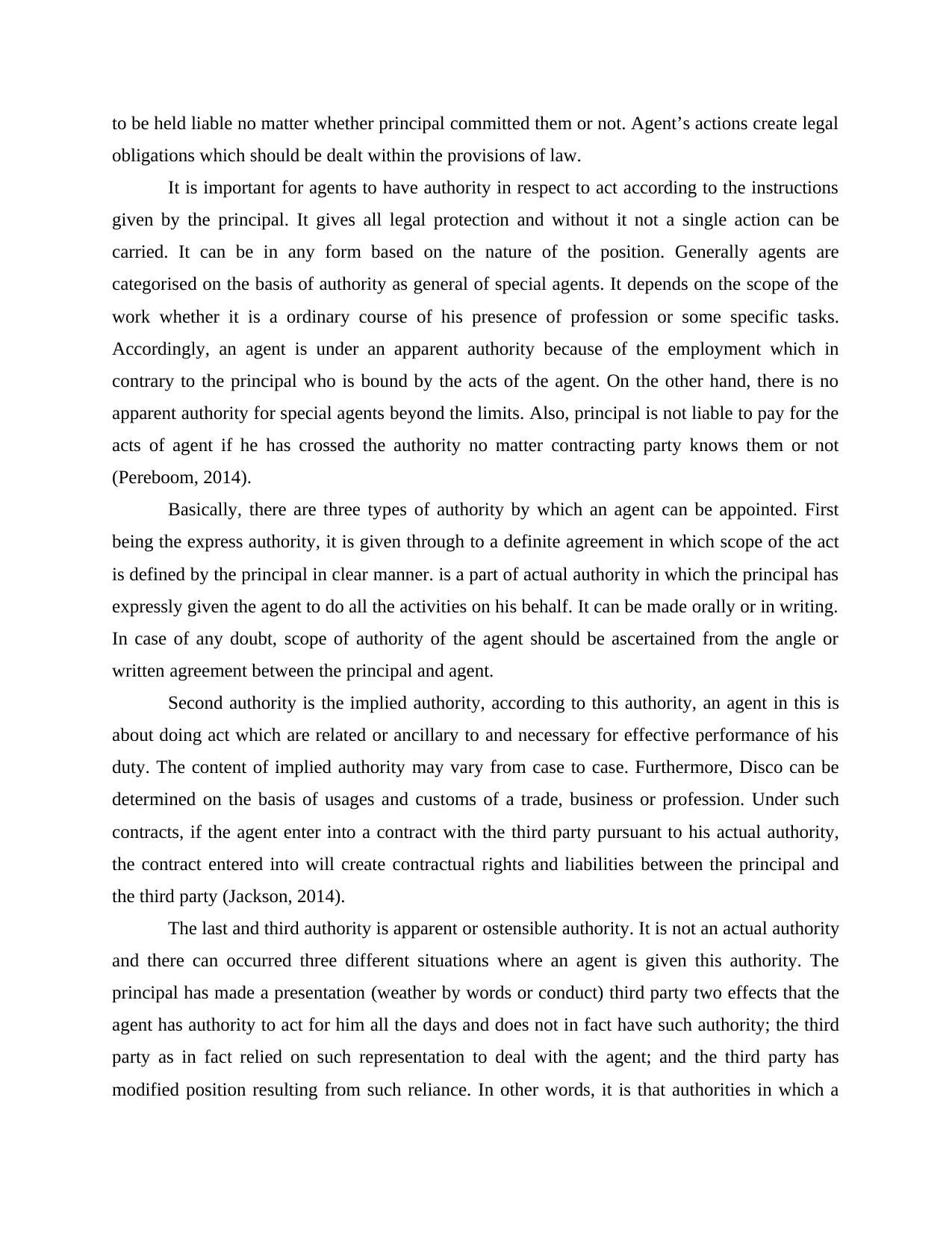
to be held liable no matter whether principal committed them or not. Agent’s actions create legal
obligations which should be dealt within the provisions of law.
It is important for agents to have authority in respect to act according to the instructions
given by the principal. It gives all legal protection and without it not a single action can be
carried. It can be in any form based on the nature of the position. Generally agents are
categorised on the basis of authority as general of special agents. It depends on the scope of the
work whether it is a ordinary course of his presence of profession or some specific tasks.
Accordingly, an agent is under an apparent authority because of the employment which in
contrary to the principal who is bound by the acts of the agent. On the other hand, there is no
apparent authority for special agents beyond the limits. Also, principal is not liable to pay for the
acts of agent if he has crossed the authority no matter contracting party knows them or not
(Pereboom, 2014).
Basically, there are three types of authority by which an agent can be appointed. First
being the express authority, it is given through to a definite agreement in which scope of the act
is defined by the principal in clear manner. is a part of actual authority in which the principal has
expressly given the agent to do all the activities on his behalf. It can be made orally or in writing.
In case of any doubt, scope of authority of the agent should be ascertained from the angle or
written agreement between the principal and agent.
Second authority is the implied authority, according to this authority, an agent in this is
about doing act which are related or ancillary to and necessary for effective performance of his
duty. The content of implied authority may vary from case to case. Furthermore, Disco can be
determined on the basis of usages and customs of a trade, business or profession. Under such
contracts, if the agent enter into a contract with the third party pursuant to his actual authority,
the contract entered into will create contractual rights and liabilities between the principal and
the third party (Jackson, 2014).
The last and third authority is apparent or ostensible authority. It is not an actual authority
and there can occurred three different situations where an agent is given this authority. The
principal has made a presentation (weather by words or conduct) third party two effects that the
agent has authority to act for him all the days and does not in fact have such authority; the third
party as in fact relied on such representation to deal with the agent; and the third party has
modified position resulting from such reliance. In other words, it is that authorities in which a
obligations which should be dealt within the provisions of law.
It is important for agents to have authority in respect to act according to the instructions
given by the principal. It gives all legal protection and without it not a single action can be
carried. It can be in any form based on the nature of the position. Generally agents are
categorised on the basis of authority as general of special agents. It depends on the scope of the
work whether it is a ordinary course of his presence of profession or some specific tasks.
Accordingly, an agent is under an apparent authority because of the employment which in
contrary to the principal who is bound by the acts of the agent. On the other hand, there is no
apparent authority for special agents beyond the limits. Also, principal is not liable to pay for the
acts of agent if he has crossed the authority no matter contracting party knows them or not
(Pereboom, 2014).
Basically, there are three types of authority by which an agent can be appointed. First
being the express authority, it is given through to a definite agreement in which scope of the act
is defined by the principal in clear manner. is a part of actual authority in which the principal has
expressly given the agent to do all the activities on his behalf. It can be made orally or in writing.
In case of any doubt, scope of authority of the agent should be ascertained from the angle or
written agreement between the principal and agent.
Second authority is the implied authority, according to this authority, an agent in this is
about doing act which are related or ancillary to and necessary for effective performance of his
duty. The content of implied authority may vary from case to case. Furthermore, Disco can be
determined on the basis of usages and customs of a trade, business or profession. Under such
contracts, if the agent enter into a contract with the third party pursuant to his actual authority,
the contract entered into will create contractual rights and liabilities between the principal and
the third party (Jackson, 2014).
The last and third authority is apparent or ostensible authority. It is not an actual authority
and there can occurred three different situations where an agent is given this authority. The
principal has made a presentation (weather by words or conduct) third party two effects that the
agent has authority to act for him all the days and does not in fact have such authority; the third
party as in fact relied on such representation to deal with the agent; and the third party has
modified position resulting from such reliance. In other words, it is that authorities in which a
Paraphrase This Document
Need a fresh take? Get an instant paraphrase of this document with our AI Paraphraser
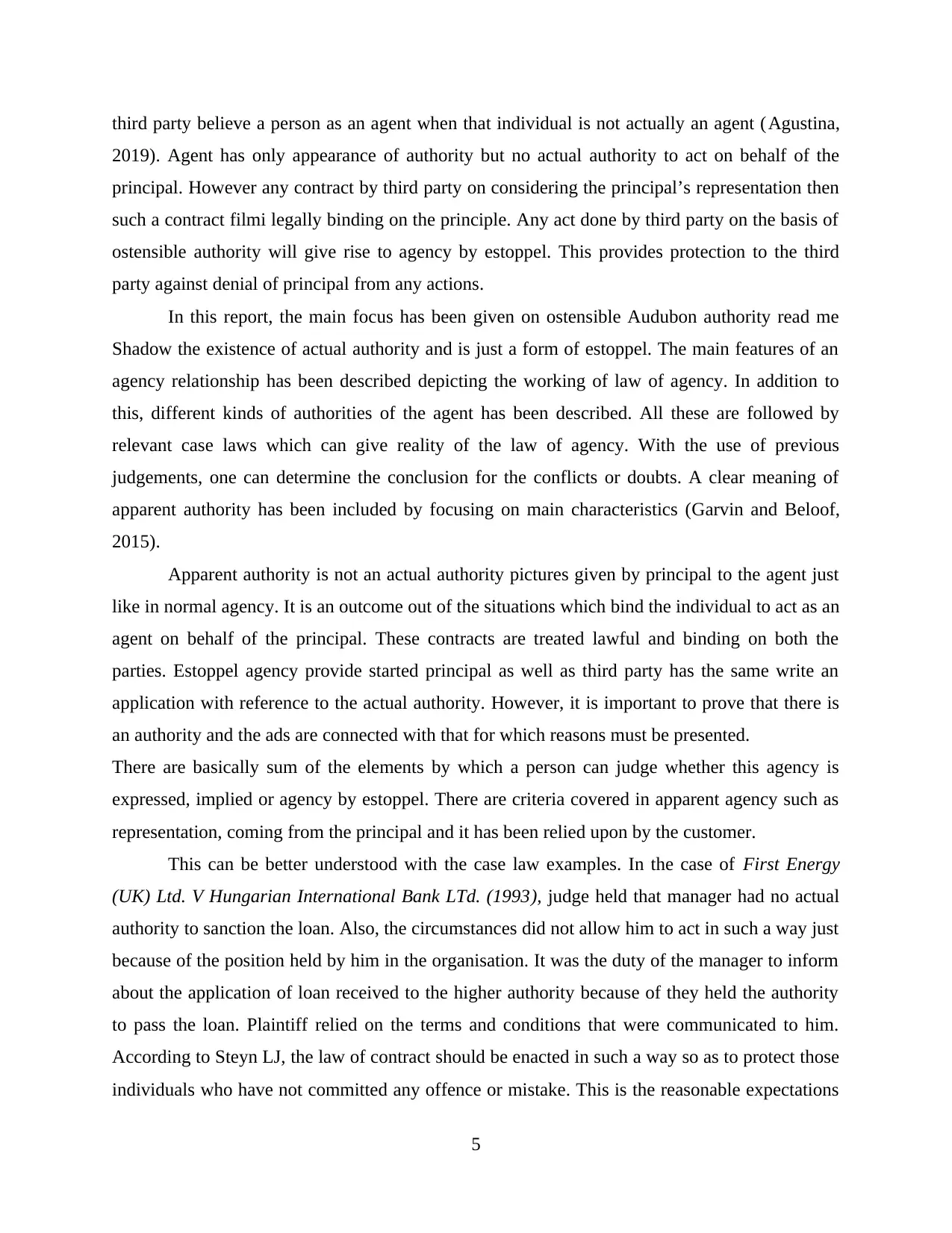
third party believe a person as an agent when that individual is not actually an agent (Agustina,
2019). Agent has only appearance of authority but no actual authority to act on behalf of the
principal. However any contract by third party on considering the principal’s representation then
such a contract filmi legally binding on the principle. Any act done by third party on the basis of
ostensible authority will give rise to agency by estoppel. This provides protection to the third
party against denial of principal from any actions.
In this report, the main focus has been given on ostensible Audubon authority read me
Shadow the existence of actual authority and is just a form of estoppel. The main features of an
agency relationship has been described depicting the working of law of agency. In addition to
this, different kinds of authorities of the agent has been described. All these are followed by
relevant case laws which can give reality of the law of agency. With the use of previous
judgements, one can determine the conclusion for the conflicts or doubts. A clear meaning of
apparent authority has been included by focusing on main characteristics (Garvin and Beloof,
2015).
Apparent authority is not an actual authority pictures given by principal to the agent just
like in normal agency. It is an outcome out of the situations which bind the individual to act as an
agent on behalf of the principal. These contracts are treated lawful and binding on both the
parties. Estoppel agency provide started principal as well as third party has the same write an
application with reference to the actual authority. However, it is important to prove that there is
an authority and the ads are connected with that for which reasons must be presented.
There are basically sum of the elements by which a person can judge whether this agency is
expressed, implied or agency by estoppel. There are criteria covered in apparent agency such as
representation, coming from the principal and it has been relied upon by the customer.
This can be better understood with the case law examples. In the case of First Energy
(UK) Ltd. V Hungarian International Bank LTd. (1993), judge held that manager had no actual
authority to sanction the loan. Also, the circumstances did not allow him to act in such a way just
because of the position held by him in the organisation. It was the duty of the manager to inform
about the application of loan received to the higher authority because of they held the authority
to pass the loan. Plaintiff relied on the terms and conditions that were communicated to him.
According to Steyn LJ, the law of contract should be enacted in such a way so as to protect those
individuals who have not committed any offence or mistake. This is the reasonable expectations
5
2019). Agent has only appearance of authority but no actual authority to act on behalf of the
principal. However any contract by third party on considering the principal’s representation then
such a contract filmi legally binding on the principle. Any act done by third party on the basis of
ostensible authority will give rise to agency by estoppel. This provides protection to the third
party against denial of principal from any actions.
In this report, the main focus has been given on ostensible Audubon authority read me
Shadow the existence of actual authority and is just a form of estoppel. The main features of an
agency relationship has been described depicting the working of law of agency. In addition to
this, different kinds of authorities of the agent has been described. All these are followed by
relevant case laws which can give reality of the law of agency. With the use of previous
judgements, one can determine the conclusion for the conflicts or doubts. A clear meaning of
apparent authority has been included by focusing on main characteristics (Garvin and Beloof,
2015).
Apparent authority is not an actual authority pictures given by principal to the agent just
like in normal agency. It is an outcome out of the situations which bind the individual to act as an
agent on behalf of the principal. These contracts are treated lawful and binding on both the
parties. Estoppel agency provide started principal as well as third party has the same write an
application with reference to the actual authority. However, it is important to prove that there is
an authority and the ads are connected with that for which reasons must be presented.
There are basically sum of the elements by which a person can judge whether this agency is
expressed, implied or agency by estoppel. There are criteria covered in apparent agency such as
representation, coming from the principal and it has been relied upon by the customer.
This can be better understood with the case law examples. In the case of First Energy
(UK) Ltd. V Hungarian International Bank LTd. (1993), judge held that manager had no actual
authority to sanction the loan. Also, the circumstances did not allow him to act in such a way just
because of the position held by him in the organisation. It was the duty of the manager to inform
about the application of loan received to the higher authority because of they held the authority
to pass the loan. Plaintiff relied on the terms and conditions that were communicated to him.
According to Steyn LJ, the law of contract should be enacted in such a way so as to protect those
individuals who have not committed any offence or mistake. This is the reasonable expectations
5
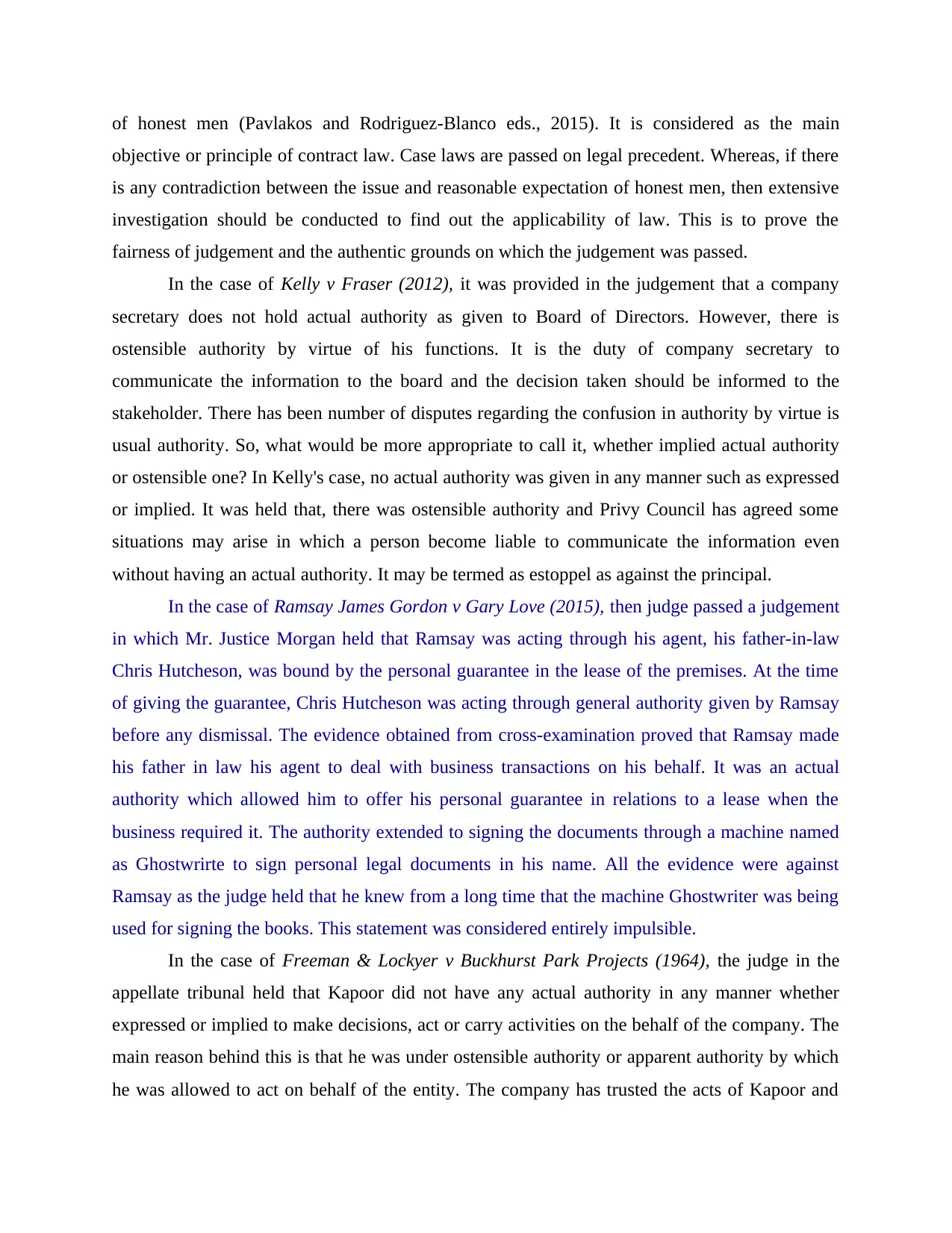
of honest men (Pavlakos and Rodriguez-Blanco eds., 2015). It is considered as the main
objective or principle of contract law. Case laws are passed on legal precedent. Whereas, if there
is any contradiction between the issue and reasonable expectation of honest men, then extensive
investigation should be conducted to find out the applicability of law. This is to prove the
fairness of judgement and the authentic grounds on which the judgement was passed.
In the case of Kelly v Fraser (2012), it was provided in the judgement that a company
secretary does not hold actual authority as given to Board of Directors. However, there is
ostensible authority by virtue of his functions. It is the duty of company secretary to
communicate the information to the board and the decision taken should be informed to the
stakeholder. There has been number of disputes regarding the confusion in authority by virtue is
usual authority. So, what would be more appropriate to call it, whether implied actual authority
or ostensible one? In Kelly's case, no actual authority was given in any manner such as expressed
or implied. It was held that, there was ostensible authority and Privy Council has agreed some
situations may arise in which a person become liable to communicate the information even
without having an actual authority. It may be termed as estoppel as against the principal.
In the case of Ramsay James Gordon v Gary Love (2015), then judge passed a judgement
in which Mr. Justice Morgan held that Ramsay was acting through his agent, his father-in-law
Chris Hutcheson, was bound by the personal guarantee in the lease of the premises. At the time
of giving the guarantee, Chris Hutcheson was acting through general authority given by Ramsay
before any dismissal. The evidence obtained from cross-examination proved that Ramsay made
his father in law his agent to deal with business transactions on his behalf. It was an actual
authority which allowed him to offer his personal guarantee in relations to a lease when the
business required it. The authority extended to signing the documents through a machine named
as Ghostwrirte to sign personal legal documents in his name. All the evidence were against
Ramsay as the judge held that he knew from a long time that the machine Ghostwriter was being
used for signing the books. This statement was considered entirely impulsible.
In the case of Freeman & Lockyer v Buckhurst Park Projects (1964), the judge in the
appellate tribunal held that Kapoor did not have any actual authority in any manner whether
expressed or implied to make decisions, act or carry activities on the behalf of the company. The
main reason behind this is that he was under ostensible authority or apparent authority by which
he was allowed to act on behalf of the entity. The company has trusted the acts of Kapoor and
objective or principle of contract law. Case laws are passed on legal precedent. Whereas, if there
is any contradiction between the issue and reasonable expectation of honest men, then extensive
investigation should be conducted to find out the applicability of law. This is to prove the
fairness of judgement and the authentic grounds on which the judgement was passed.
In the case of Kelly v Fraser (2012), it was provided in the judgement that a company
secretary does not hold actual authority as given to Board of Directors. However, there is
ostensible authority by virtue of his functions. It is the duty of company secretary to
communicate the information to the board and the decision taken should be informed to the
stakeholder. There has been number of disputes regarding the confusion in authority by virtue is
usual authority. So, what would be more appropriate to call it, whether implied actual authority
or ostensible one? In Kelly's case, no actual authority was given in any manner such as expressed
or implied. It was held that, there was ostensible authority and Privy Council has agreed some
situations may arise in which a person become liable to communicate the information even
without having an actual authority. It may be termed as estoppel as against the principal.
In the case of Ramsay James Gordon v Gary Love (2015), then judge passed a judgement
in which Mr. Justice Morgan held that Ramsay was acting through his agent, his father-in-law
Chris Hutcheson, was bound by the personal guarantee in the lease of the premises. At the time
of giving the guarantee, Chris Hutcheson was acting through general authority given by Ramsay
before any dismissal. The evidence obtained from cross-examination proved that Ramsay made
his father in law his agent to deal with business transactions on his behalf. It was an actual
authority which allowed him to offer his personal guarantee in relations to a lease when the
business required it. The authority extended to signing the documents through a machine named
as Ghostwrirte to sign personal legal documents in his name. All the evidence were against
Ramsay as the judge held that he knew from a long time that the machine Ghostwriter was being
used for signing the books. This statement was considered entirely impulsible.
In the case of Freeman & Lockyer v Buckhurst Park Projects (1964), the judge in the
appellate tribunal held that Kapoor did not have any actual authority in any manner whether
expressed or implied to make decisions, act or carry activities on the behalf of the company. The
main reason behind this is that he was under ostensible authority or apparent authority by which
he was allowed to act on behalf of the entity. The company has trusted the acts of Kapoor and
⊘ This is a preview!⊘
Do you want full access?
Subscribe today to unlock all pages.

Trusted by 1+ million students worldwide
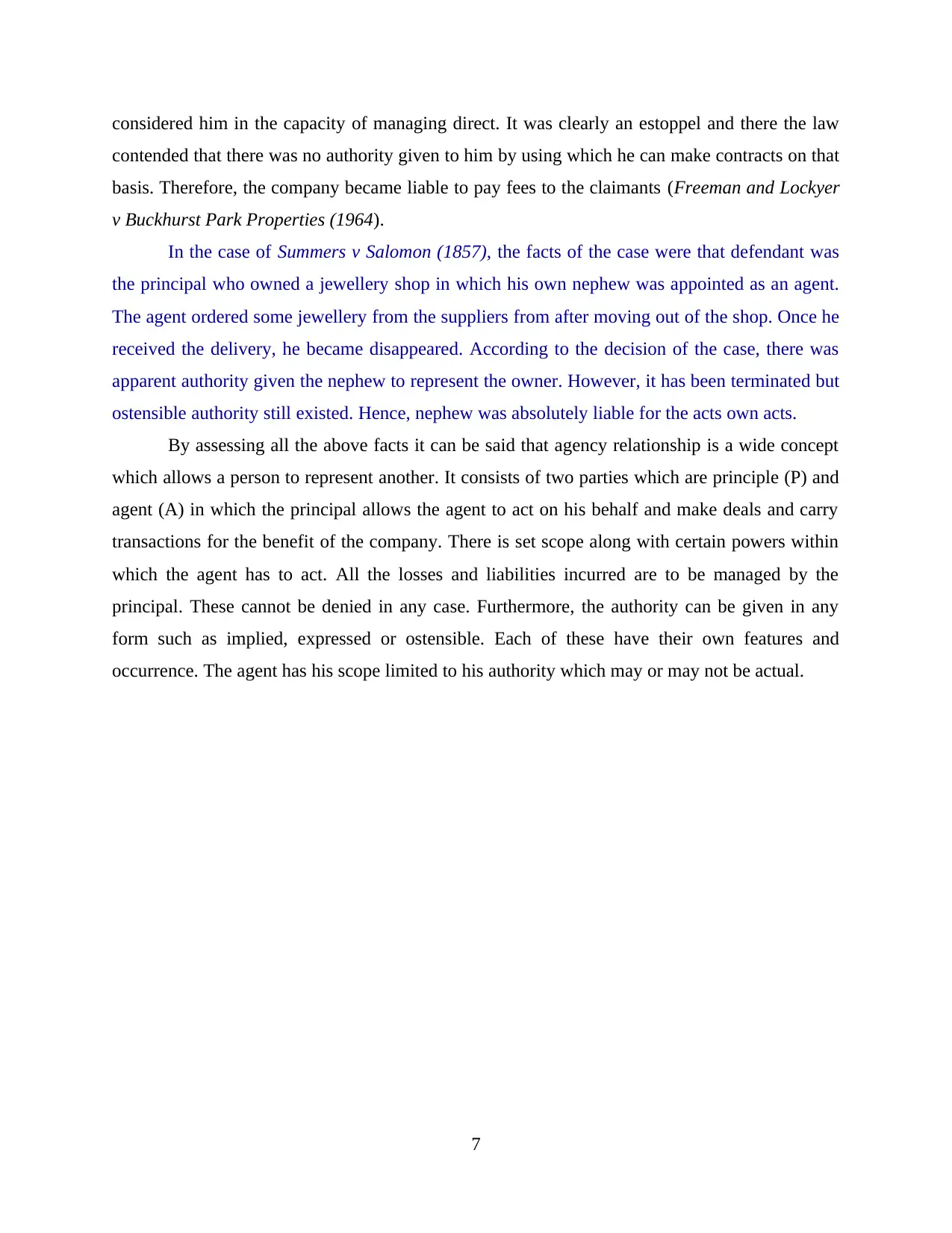
considered him in the capacity of managing direct. It was clearly an estoppel and there the law
contended that there was no authority given to him by using which he can make contracts on that
basis. Therefore, the company became liable to pay fees to the claimants (Freeman and Lockyer
v Buckhurst Park Properties (1964).
In the case of Summers v Salomon (1857), the facts of the case were that defendant was
the principal who owned a jewellery shop in which his own nephew was appointed as an agent.
The agent ordered some jewellery from the suppliers from after moving out of the shop. Once he
received the delivery, he became disappeared. According to the decision of the case, there was
apparent authority given the nephew to represent the owner. However, it has been terminated but
ostensible authority still existed. Hence, nephew was absolutely liable for the acts own acts.
By assessing all the above facts it can be said that agency relationship is a wide concept
which allows a person to represent another. It consists of two parties which are principle (P) and
agent (A) in which the principal allows the agent to act on his behalf and make deals and carry
transactions for the benefit of the company. There is set scope along with certain powers within
which the agent has to act. All the losses and liabilities incurred are to be managed by the
principal. These cannot be denied in any case. Furthermore, the authority can be given in any
form such as implied, expressed or ostensible. Each of these have their own features and
occurrence. The agent has his scope limited to his authority which may or may not be actual.
7
contended that there was no authority given to him by using which he can make contracts on that
basis. Therefore, the company became liable to pay fees to the claimants (Freeman and Lockyer
v Buckhurst Park Properties (1964).
In the case of Summers v Salomon (1857), the facts of the case were that defendant was
the principal who owned a jewellery shop in which his own nephew was appointed as an agent.
The agent ordered some jewellery from the suppliers from after moving out of the shop. Once he
received the delivery, he became disappeared. According to the decision of the case, there was
apparent authority given the nephew to represent the owner. However, it has been terminated but
ostensible authority still existed. Hence, nephew was absolutely liable for the acts own acts.
By assessing all the above facts it can be said that agency relationship is a wide concept
which allows a person to represent another. It consists of two parties which are principle (P) and
agent (A) in which the principal allows the agent to act on his behalf and make deals and carry
transactions for the benefit of the company. There is set scope along with certain powers within
which the agent has to act. All the losses and liabilities incurred are to be managed by the
principal. These cannot be denied in any case. Furthermore, the authority can be given in any
form such as implied, expressed or ostensible. Each of these have their own features and
occurrence. The agent has his scope limited to his authority which may or may not be actual.
7
Paraphrase This Document
Need a fresh take? Get an instant paraphrase of this document with our AI Paraphraser
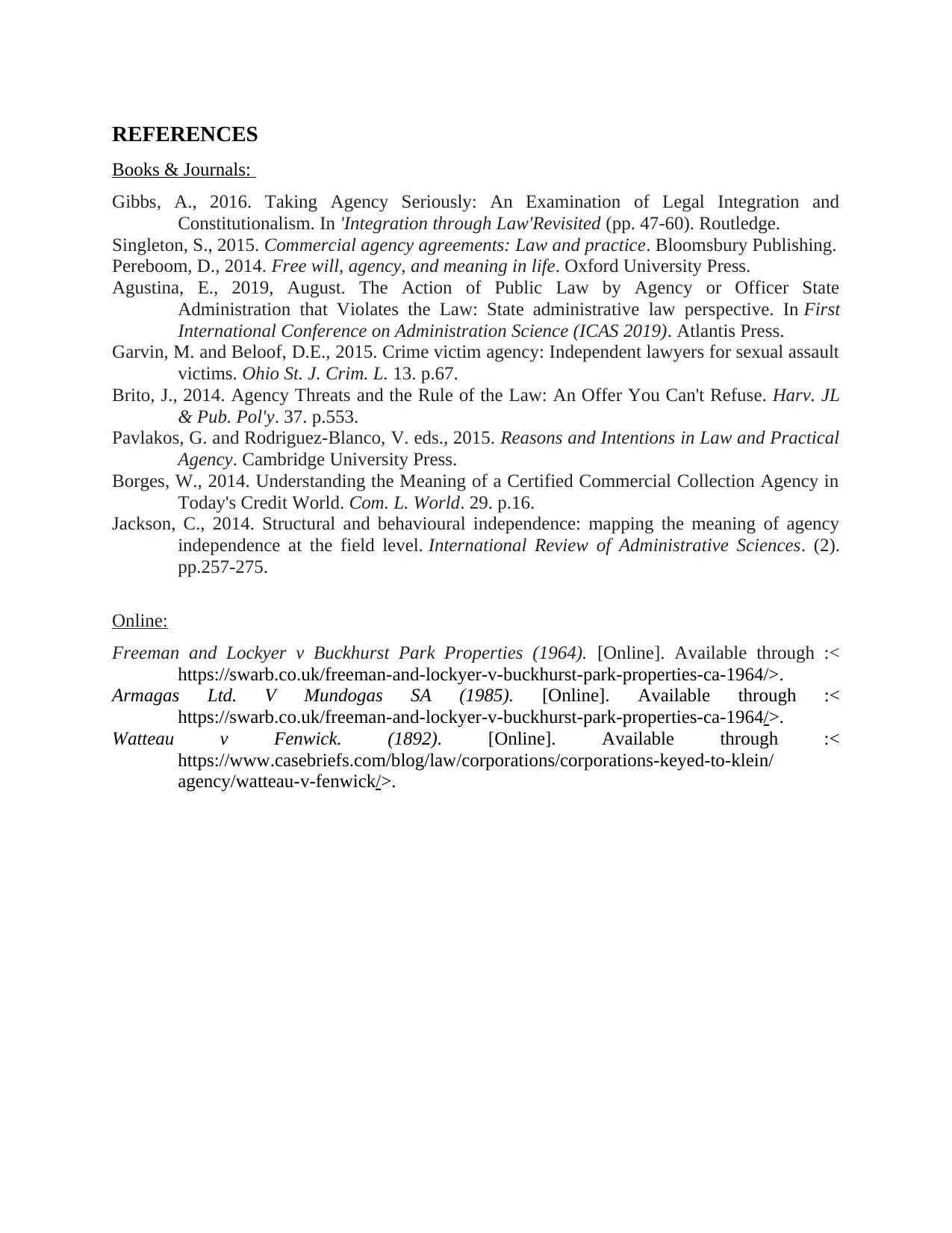
REFERENCES
Books & Journals:
Gibbs, A., 2016. Taking Agency Seriously: An Examination of Legal Integration and
Constitutionalism. In 'Integration through Law'Revisited (pp. 47-60). Routledge.
Singleton, S., 2015. Commercial agency agreements: Law and practice. Bloomsbury Publishing.
Pereboom, D., 2014. Free will, agency, and meaning in life. Oxford University Press.
Agustina, E., 2019, August. The Action of Public Law by Agency or Officer State
Administration that Violates the Law: State administrative law perspective. In First
International Conference on Administration Science (ICAS 2019). Atlantis Press.
Garvin, M. and Beloof, D.E., 2015. Crime victim agency: Independent lawyers for sexual assault
victims. Ohio St. J. Crim. L. 13. p.67.
Brito, J., 2014. Agency Threats and the Rule of the Law: An Offer You Can't Refuse. Harv. JL
& Pub. Pol'y. 37. p.553.
Pavlakos, G. and Rodriguez-Blanco, V. eds., 2015. Reasons and Intentions in Law and Practical
Agency. Cambridge University Press.
Borges, W., 2014. Understanding the Meaning of a Certified Commercial Collection Agency in
Today's Credit World. Com. L. World. 29. p.16.
Jackson, C., 2014. Structural and behavioural independence: mapping the meaning of agency
independence at the field level. International Review of Administrative Sciences. (2).
pp.257-275.
Online:
Freeman and Lockyer v Buckhurst Park Properties (1964). [Online]. Available through :<
https://swarb.co.uk/freeman-and-lockyer-v-buckhurst-park-properties-ca-1964/>.
Armagas Ltd. V Mundogas SA (1985). [Online]. Available through :<
https://swarb.co.uk/freeman-and-lockyer-v-buckhurst-park-properties-ca-1964/>.
Watteau v Fenwick. (1892). [Online]. Available through :<
https://www.casebriefs.com/blog/law/corporations/corporations-keyed-to-klein/
agency/watteau-v-fenwick/>.
Books & Journals:
Gibbs, A., 2016. Taking Agency Seriously: An Examination of Legal Integration and
Constitutionalism. In 'Integration through Law'Revisited (pp. 47-60). Routledge.
Singleton, S., 2015. Commercial agency agreements: Law and practice. Bloomsbury Publishing.
Pereboom, D., 2014. Free will, agency, and meaning in life. Oxford University Press.
Agustina, E., 2019, August. The Action of Public Law by Agency or Officer State
Administration that Violates the Law: State administrative law perspective. In First
International Conference on Administration Science (ICAS 2019). Atlantis Press.
Garvin, M. and Beloof, D.E., 2015. Crime victim agency: Independent lawyers for sexual assault
victims. Ohio St. J. Crim. L. 13. p.67.
Brito, J., 2014. Agency Threats and the Rule of the Law: An Offer You Can't Refuse. Harv. JL
& Pub. Pol'y. 37. p.553.
Pavlakos, G. and Rodriguez-Blanco, V. eds., 2015. Reasons and Intentions in Law and Practical
Agency. Cambridge University Press.
Borges, W., 2014. Understanding the Meaning of a Certified Commercial Collection Agency in
Today's Credit World. Com. L. World. 29. p.16.
Jackson, C., 2014. Structural and behavioural independence: mapping the meaning of agency
independence at the field level. International Review of Administrative Sciences. (2).
pp.257-275.
Online:
Freeman and Lockyer v Buckhurst Park Properties (1964). [Online]. Available through :<
https://swarb.co.uk/freeman-and-lockyer-v-buckhurst-park-properties-ca-1964/>.
Armagas Ltd. V Mundogas SA (1985). [Online]. Available through :<
https://swarb.co.uk/freeman-and-lockyer-v-buckhurst-park-properties-ca-1964/>.
Watteau v Fenwick. (1892). [Online]. Available through :<
https://www.casebriefs.com/blog/law/corporations/corporations-keyed-to-klein/
agency/watteau-v-fenwick/>.
1 out of 8
Related Documents
Your All-in-One AI-Powered Toolkit for Academic Success.
+13062052269
info@desklib.com
Available 24*7 on WhatsApp / Email
![[object Object]](/_next/static/media/star-bottom.7253800d.svg)
Unlock your academic potential
Copyright © 2020–2026 A2Z Services. All Rights Reserved. Developed and managed by ZUCOL.




